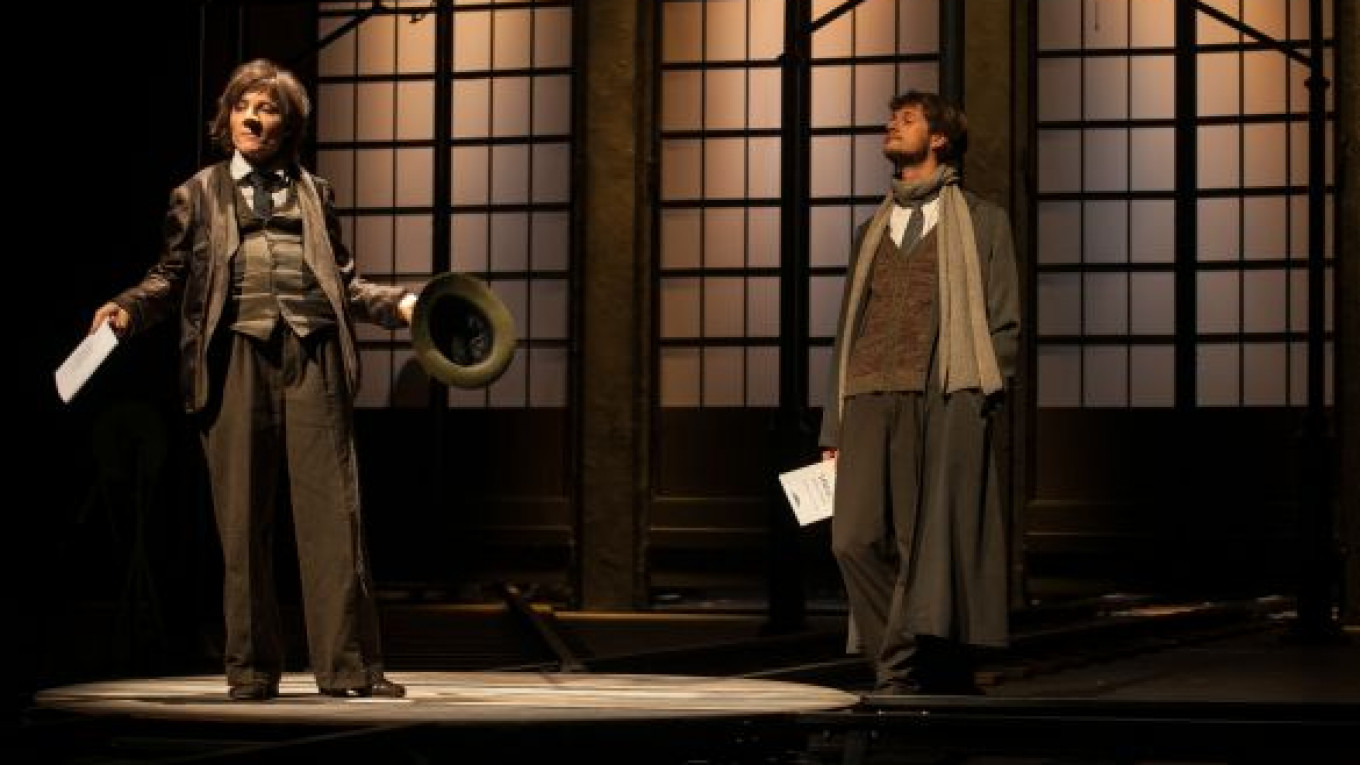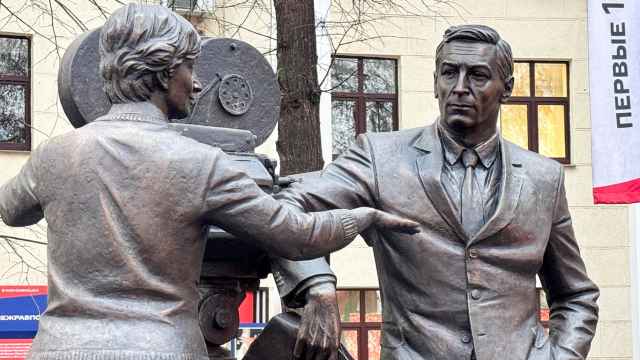One of the biggest unknowns facing Moscow theater in the near future is the fate of the Fomenko Studio.
Pyotr Fomenko died in August just short of the beginning of his theater's 20th anniversary season. While the studio can boast of a large company of popular actors, and although it has collaborated with accomplished directors throughout its history, it belonged to Fomenko. Without him what will become of this playhouse, one of this city's two or three most popular?
I may be overstepping but I thought I saw a beautiful reflection of that uncertainty in the opening moments of Yevgeny Kamenkovich's new production of "The Gift" at the theater.
A small, timid figure appeared in a bank of fog, carefully and hesitantly stepping over the uneven ties of a railway. Several railways on stage headed out in various directions. Above the figure, appearing in the gloom to be a spitting image of Charlie Chaplin, hovered crooked telegraph posts that looked something like a field of crosses in an abandoned cemetery.
"The Gift" was in rehearsals well before Fomenko's death. Perhaps this is all just a coincidence I conjured in my mind. But even if that is true, the image's impact is no less powerful and suggestive. What path, indeed, will the Fomenko Studio take?
For the time being we have Kamenkovich's "Gift," a dramatization of the last novel Vladimir Nabokov wrote in Russian. It is a production that embraces the atmosphere of Literature with a capital letter. Kamenkovich in the program designates its genre as nothing less than an "aesthetic correlation of art to reality."
The Charlie Chaplin figure, played by Polina Kutepova, emerges soon enough as a Nikolai Gogol figure, replete with an oversized nose. This sexless individual named Yelizaveta is a critic, a supportive friend and nagging enemy to Fyodor Godunov-Cherdyntsev (Fyodor Malyshev), a novelist who is the work's central protagonist.
Like many others surrounding them, these characters are painted in a nostalgic, even sentimental array of dim colors. The city of Berlin in the pre-war years, where the novel is set, is vague and gloomy. As imagined by designer Vladimir Maximov, Berlin is little more than a noisy, uncomfortable railway station. People here are often harshly eccentric, sometimes unpleasantly so, as is the case with Fyodor's landlords Frau Stoboi (Nadja Mer) and Boris Shchegolev (Mikhail Krylov).
More well-disposed to the writer are his mother (Serafima Ogaryova), father (Yury Buturin) and sister (Yekaterina Smirnova), although they are usually present only in his mind, as he remembers them from his youth. Even his girlfriend Zinaida (Maria Andreyeva), just one of 51 readers to buy his book of poems, is as distant as she is present. She seems important primarily as one who validates him as a writer. She and the poet Koncheyev (Yury Titov) are among the few who support his second publication, a biography about the 19th century critic Nikolai Chernyshevsky that is roundly condemned by members of the Russian émigré literary community.
Kamenkovich's episodic production drifts back and forth from the present to the past, from imagination to reality in relatively short bursts. The fact that the sum of these episodes adds up to four hours of performance time is no small obstacle. It hardly seems that a story unfolds; instead we are offered a prolonged static picture of a young writer surrounded by family, society, friends and enemies.
Russian literature is held up for admiration or ridicule for those intrigued by the topic. Conversational essays about Pushkin, Gogol, Tolstoy and others allow spectators to connect with their favorite writers. Signaling the erudition of the audience the night I attended, the first laugh erupted when the critic Yelizaveta scoffed that Aksakov wasn't worth discussion.
But aside from atmospherics, this "Gift" rarely goes deeply into anything, whether it is literature or character.
Fyodor remains an enigma, though not in the intriguing way that characterizes his absent father. A zoologist with a soft spot for butterflies, his father is a bluffer, an adventurist, a delightfully unreliable man, one driven by passion. His son, by contrast, seems flat and uninteresting. We do not come to know him as a person or a writer.
Perhaps any attempt to transform Nabokov's hyper-literary prose into a relatively traditional, psychologically based performance text is bound to encounter this difficulty. In any case, I could not shake the feeling that "The Gift" remained trapped in the literature from which it vainly hoped to spring.
"The Gift" (Dar) plays Sun., Mon., Oct. 3, 9, 26 and 29 at 7 p.m. at the Fomenko Studio New Stage, located at 29 Naberezhnaya Tarasa Shevchenko. Metro Kutuzovskaya. Tel. 499-249-1921. . Running time: 4 hours.
A Message from The Moscow Times:
Dear readers,
We are facing unprecedented challenges. Russia's Prosecutor General's Office has designated The Moscow Times as an "undesirable" organization, criminalizing our work and putting our staff at risk of prosecution. This follows our earlier unjust labeling as a "foreign agent."
These actions are direct attempts to silence independent journalism in Russia. The authorities claim our work "discredits the decisions of the Russian leadership." We see things differently: we strive to provide accurate, unbiased reporting on Russia.
We, the journalists of The Moscow Times, refuse to be silenced. But to continue our work, we need your help.
Your support, no matter how small, makes a world of difference. If you can, please support us monthly starting from just $2. It's quick to set up, and every contribution makes a significant impact.
By supporting The Moscow Times, you're defending open, independent journalism in the face of repression. Thank you for standing with us.
Remind me later.







